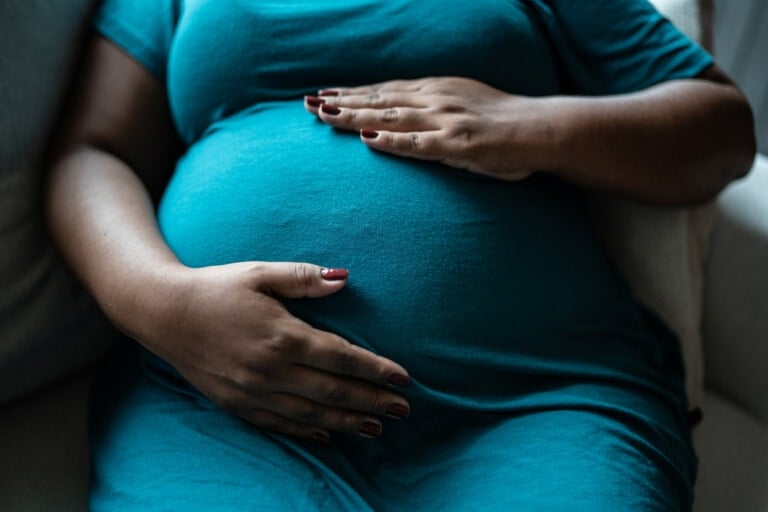The first trimester of pregnancy is the most crucial time since the fertilized cell is growing rapidly.1 But what happens when the fetus inside you isn’t growing in the correct place? Instead of being in your uterus, it’s in your fallopian tube, cervix, ovary, or abdominal cavity. This is what we call an ectopic pregnancy.2
An ectopic pregnancy is dangerous for moms and has to be removed.3 To help you identify if you have an ectopic pregnancy, we’ve laid out ectopic pregnancy symptoms, common pain experienced, causes, risk factors, and treatment options.
What Is an Ectopic Pregnancy?
In a normal pregnancy, a fertilized egg travels to the uterus and attaches itself to the uterine lining.6 An ectopic pregnancy occurs when the egg implants outside the uterus, such as in the abdominal cavity, cervix, or ovary. Often, ectopic pregnancies occur in the fallopian tubes, which has given way to the common moniker “tubal pregnancy.”2,3
An ectopic pregnancy is life-threatening for moms, and you must have it removed.3,4 The fertilized egg cannot properly develop and, if it keeps growing in the wrong area, can cause internal bleeding.5,7 It can also burst or rupture the organ to which it’s affixed.3
What Causes an Ectopic Pregnancy?
Risk factors for ectopic pregnancy include prior ectopic pregnancy, prior damage to the fallopian tubes, pelvic infection (such as PID), prior pelvic or fallopian tube surgery, history of infertility, and use of assisted reproductive technology.2,4 Other less significant risk factors include a history of cigarette smoking and an age older than 35.2 Since most ectopic pregnancies are tubal, the likely cause is issues in the fallopian tube.8
During a tubal pregnancy, the fertilized egg cannot quickly move down the fallopian tube into the uterus and becomes stuck. Typically, this happens if either an infection or inflammation damages the fallopian tube, but some other factors that can cause a blockage are:8
- Endometriosis (a condition that occurs when the tissue from the uterus grows outside of it)3
- Pelvic inflammatory disease (PID)4
- Scar tissue from a previous surgery in the abdominal cavity, fallopian tube, or pelvis5
How Common Is an Ectopic Pregnancy?
About one in 50 pregnancies in the United States are ectopic, with over 90% happening in the fallopian tubes.2,3 Although any woman can experience an ectopic pregnancy, some are more at risk if they are older than 35, smoke cigarettes, have a sexually transmitted infection, or have had (or are having) fertility treatments.2,3
Specific medical conditions can also increase the chance of having an ectopic pregnancy. These include having a scar from pelvic surgery or suffering from PID, a former ectopic pregnancy, or tubal ligation surgery, which closes the fallopian tubes to prevent future pregnancies.4,5,9
Women who have had one should not lose hope, as there is a silver lining. About one in three women will have a baby after an ectopic pregnancy.3
Signs of Ectopic Pregnancy
At first, some women may not notice any alarming signs of an ectopic pregnancy.3,7 They’ll often feel the signs and symptoms that usually happen early in a pregnancy, like breast tenderness, fatigue, frequent urination, missed menstrual cycles, morning sickness, or nausea.3 However, even if a pregnancy test has a positive result, an ectopic pregnancy can’t go on normally.8
The initial warning signs that can alert moms that something is wrong are light bleeding not associated with their period and pain in the pelvic region.10
Common Symptoms of Ectopic Pregnancy
Various symptoms can alert women of an ectopic pregnancy, such as:3,10
- Pain that occurs on one side of the body
- Dizziness or fainting
- Vaginal bleeding or spotting (light or heavy)
- Low blood pressure, as a result of blood loss
- Pains in your abdomen, neck, shoulder, pelvis, or rectum
- Upset stomach and vomiting
- Weakness
While most ectopic pregnancies are detected before they rupture, women should seek medical attention and contact their health professionals immediately if they notice any of the mentioned symptoms.4
Does Ectopic Pregnancy Cause Pain?
Ectopic pregnancy pain can range from lower backaches to mild or intense pain in the abdomen, pelvis, or rectum.3,10 There may be discomfort in the shoulder or neck, which results from the blood that builds up in the abdomen and irritated nerves due to a ruptured ectopic pregnancy.8,10 It’s also common to get belly pain, which can come on suddenly or gradually develop and can last for a while or come and go.10
When Does Ectopic Pregnancy Pain Start?
Those suffering from an ectopic pregnancy can develop symptoms anywhere from the fourth to the 12th week of pregnancy. However, this is not the same for everyone. Some women do not feel any early signs and may discover they have an ectopic pregnancy from an early scan or if symptoms present themselves later.7
Ectopic Pregnancy Treatment
An ectopic pregnancy can be hard to accept, but it’s critical to treat it quickly to prevent serious health problems. Unfortunately, the pregnancy cannot be saved since the fertilized egg cannot survive outside the uterus.8,12 You need treatment to remove the pregnancy before it grows and causes problems for the organs it is implanted on.12
Your doctor will review two main treatment options with you: medicine and surgery.11 Another treatment option is expectant management (where health professionals will monitor you and decide if treatment is necessary), but this is only for specific circumstances.2,12
Depending on the symptoms you experience, the size of the fetus, and the level of pregnancy hormone (human chorionic gonadotropin) in your blood, you may be offered one of the following:
Medication
When a fallopian tube hasn’t ruptured, and the pregnancy is not far along, your doctor can inject you with methotrexate — a medication that stops the pregnancy from progressing.12
Surgery
In most cases, a laparoscopy (or keyhole surgery) is conducted by creating a small incision in the belly to insert a thin, flexible tube (or a laparoscope) and surgical instruments to remove the fetus. Your doctor may remove the fallopian tube if it’s ruptured or infected.5,12
If the fallopian tube ruptures, you need emergency surgery. The surgeon will create a larger incision (called a laparotomy) to halt the bleeding and, if possible, repair the damaged fallopian tube.12
It can be challenging to come to terms with an ectopic pregnancy. But if you are pregnant and experiencing any alarming symptoms, it’s vital to contact your doctor immediately. Your health matters, and you must have the ectopic pregnancy removed to keep you safe. This also helps your chances of having a healthy pregnancy down the line.13
































